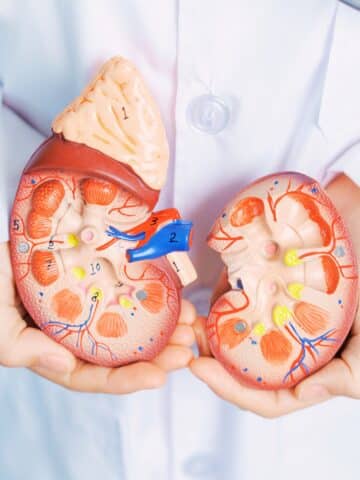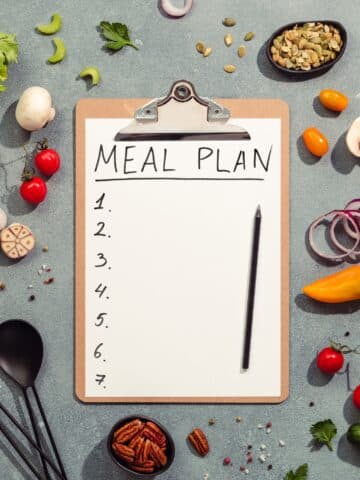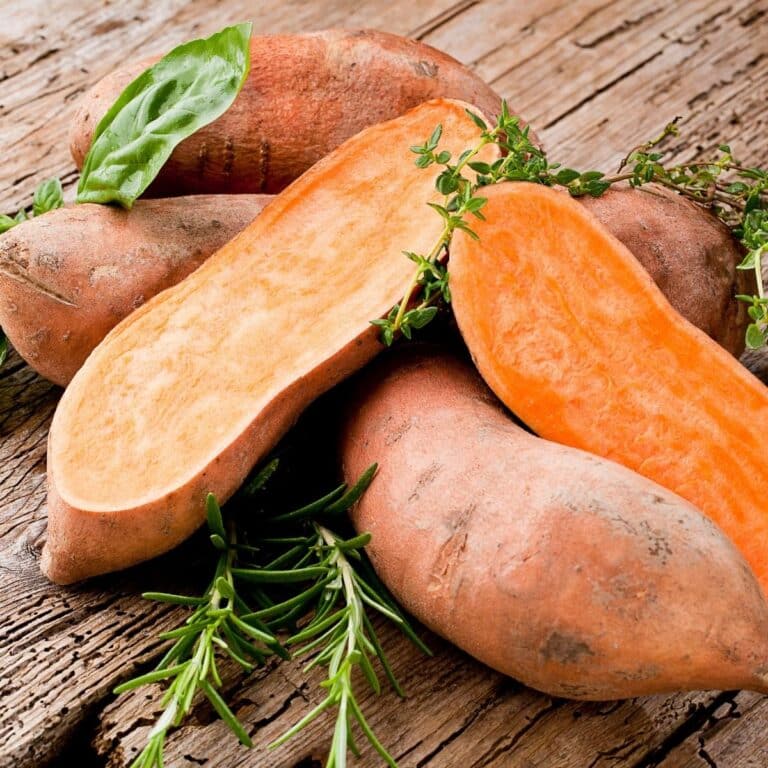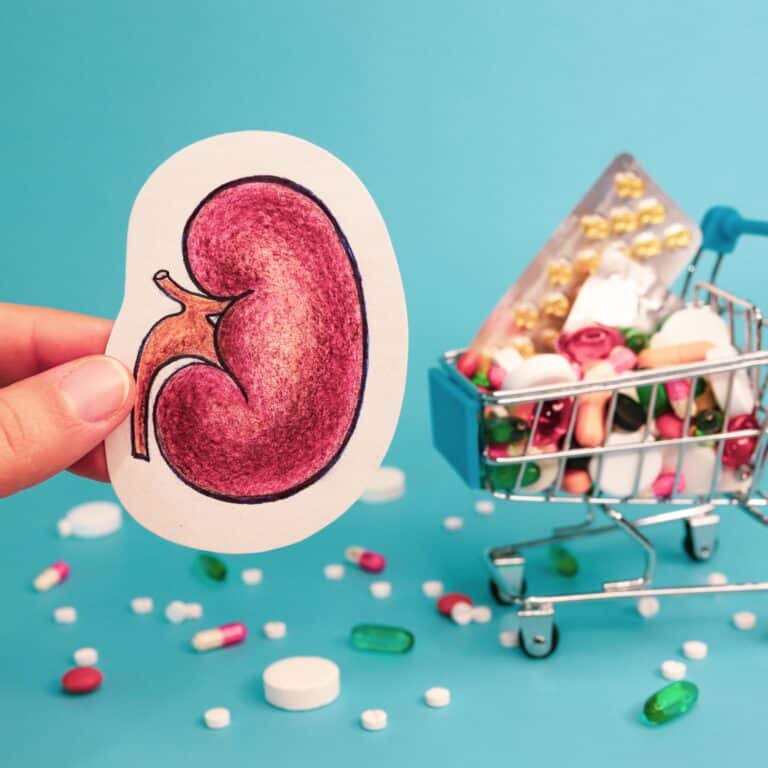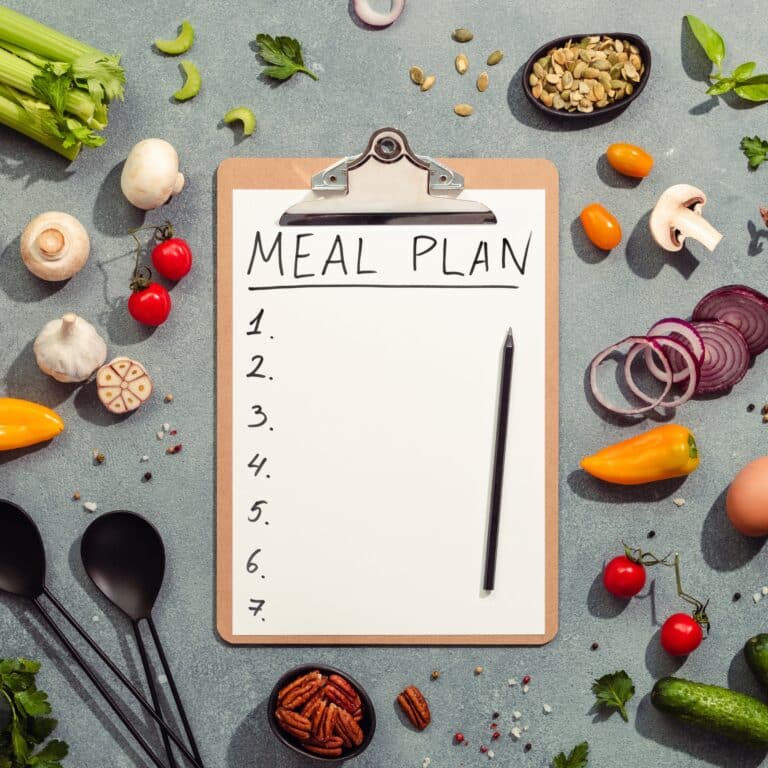Meatless Meals For CKD Patients
You're stepping into a world where kidney health meets delectable vegetarian cuisine on a plant based diet.
As a Chronic Kidney Disease (CKD) sufferer, limiting protein intake is crucial, and it's simpler than you'd think.
Let's unravel the secrets of meatless meals together, discovering how plant-based proteins can enhance your renal diet.
We'll explore meal planning strategies, navigate potential pitfalls, and celebrate the benefits.

Welcome to a journey of taste and health.
Embrace the power of meatless meals for your CKD journey. There are also plant-based meat substitutes out there that you can enjoy. If you have any questions, you can always speak to a renal dietitian.
Jump to:
- Key Takeaways
- Understanding Vegetarian Diets
- Meal Planning for CKD Patients
- Protein Sources in Vegetarian Diet
- Benefits of Plant-Based Proteins
- Potential Challenges of Vegetarian Diet
- Sodium and Phosphate Restrictions
- Protein Intake in a Renal Diet
- Plant-based Proteins for CKD Patients
- Precautions With Plant-Based Proteins
- Advantages of Meatless Meals
- FAQs About Meatless Meals for CKD Patients
- Meatless Meals For CKD Patients
Key Takeaways
- Plant-based protein sources are beneficial for CKD patients as they can help reduce proteinuria and slow the decline of kidney function.
- Meat substitutes, tofu, soy, beans, nuts, eggs, and dairy products can be included in a renal diet to provide adequate protein.
- Careful dietary planning is important to limit high-sodium, phosphorus, and potassium foods based on kidney function.
- Meatless meals can have positive effects on overall kidney health, including controlling blood lipids and reducing kidney tissue damage compared to animal proteins.
For More Recipes and Ideas --->> Get Your Free Meals and Recipes That Are Perfect for Pre-Dialysis Diets, Pre-Dialysis with Diabetes, or Dialysis Diets.
Understanding Vegetarian Diets
You're likely aware that there are various forms of diet for vegetarians, each with its unique features and nutritional benefits. However, as a CKD patient, it's crucial to understand these diets in depth to ensure you're meeting your specific dietary needs.
Let's explore the different types of vegetarian diets and identify potential pitfalls, especially focusing on managing protein intake, phosphorus and potassium levels while dealing with renal insufficiency and other Chronic Diseases.
Types of Vegetarian Diets
When managing a kidney-friendly diet, it's important to understand the different types of vegetarian diets you might consider. The main types include:
- Lacto-vegetarian: Consumes dairy but no meat or eggs.
- Ovo-vegetarian: Eats eggs but no meat or dairy.
- Lacto-ovo vegetarian: Includes both eggs and dairy but no meat.
- Vegan: Consumes no animal products at all.
Each diet offers unique benefits for CKD patients, including vegetarian protein options that help manage sodium and control phosphate using meat alternatives.
However, it's crucial to evaluate these meatless protein options carefully. Remember, not every vegetarian protein source is kidney-friendly. Some might be high in sodium or phosphates.
Understanding vegetarian diets will empower you to make the right dietary decisions, helping manage your CKD more effectively for renal patients.
Vegetarian Diet Pitfalls
Despite the many benefits of a vegetarian diet for CKD patients, it's crucial to be aware of some potential pitfalls. Evaluating protein sources is key because you need to ensure you're getting enough protein from vegetarian options.
This can be a challenge as some plant-based proteins are high in amounts of sodium and phosphates, which need to be controlled in a CKD diet.
Managing nutrient intake is another hurdle. You'll need to balance your intake of other nutrients while accommodating the dietary restrictions of CKD.
| Potential Challenge | Solution |
|---|---|
| Evaluating protein sources | Include variety of vegetarian protein options |
| Managing nutrient intake | Monitor and adjust as needed |
| Sodium and phosphate control | Choose low-sodium, low-phosphate foods |
Navigating these pitfalls requires careful planning, but with diligence, you can maintain a healthy, meatless CKD diet.
Meal Planning for CKD Patients
As you plan your meals, it's crucial to keep track of the nutrients you're consuming, particularly if you have CKD. Your focus should be on incorporating vegetarian protein sources that cater to your dietary needs. You can even take the time to try processed plant-based products.
Nutrient Monitoring in CKD
You'll need to carefully monitor your nutrient intake when planning meatless meals for managing CKD. Kidney health, protein intake, your lipid profile, and dietary restrictions must be factored in.
- Nutrient Monitoring
- Keep an eye on your protein intake. Opt for plant-based proteins like legumes, tofu, and nuts and other plant based alternatives.
- Monitor your lipid profile. Reducing meat can help manage cholesterol levels.
- Kidney Health
- Prioritize foods beneficial for kidney health. Incorporate fruits, vegetables and whole grains.
- Dietary Restrictions
- Be mindful of your sodium, potassium, and phosphorus levels. Limit foods that are high in these nutrients.
- Eating fresh fruit, plant-based foods, and making good food choices are all an important part of nutrient monitoring in CKD.
Staying on top of these aspects will ensure you're nourishing your body while looking after your kidneys.
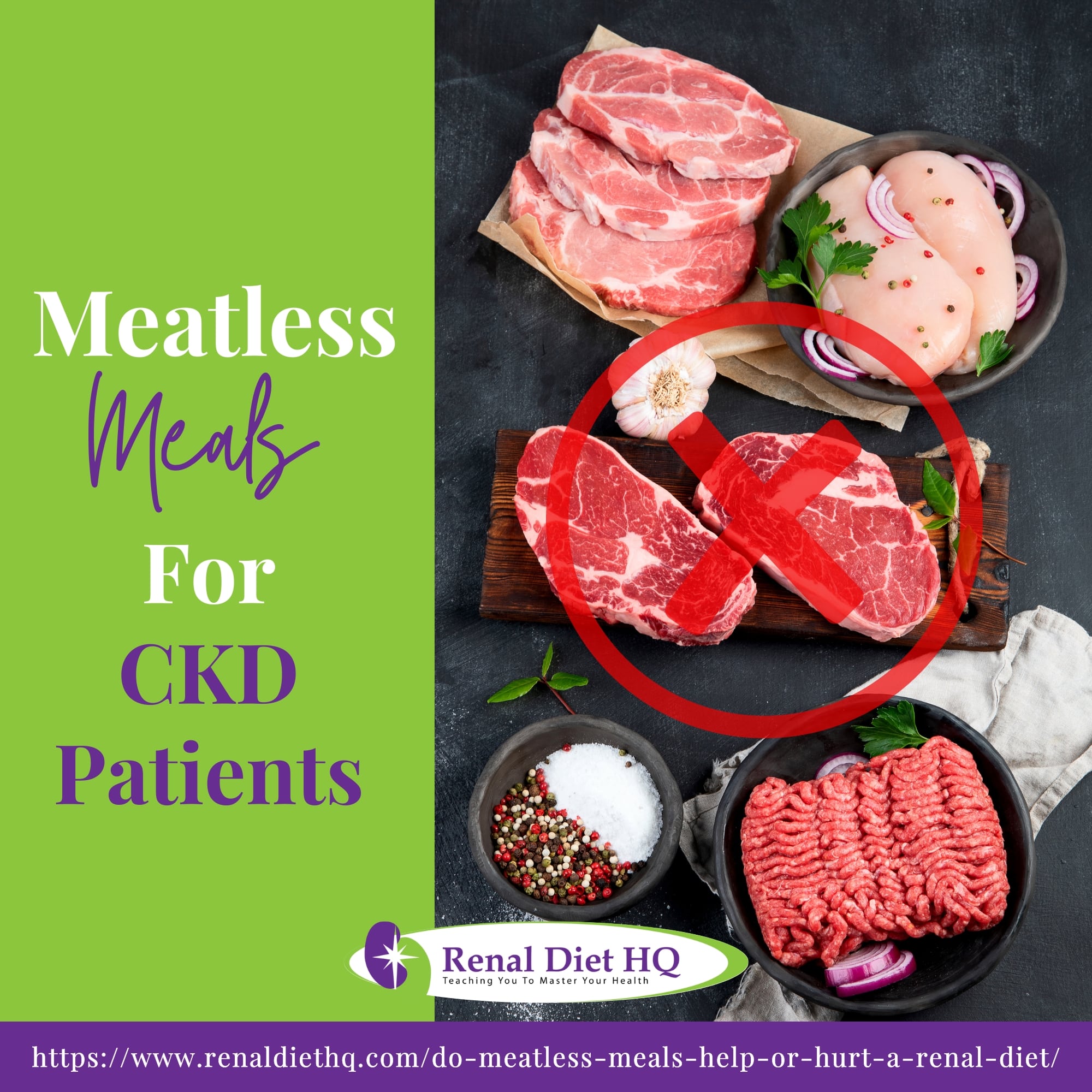
Vegetarian Protein Sources
Incorporating vegetarian protein sources into your meal plan is a crucial step in managing your CKD while maintaining a meatless diet. Understanding vegetarian protein and its benefits can help you make informed choices. Here are some protein alternatives:
| Plant-Based Protein | Benefits |
|---|---|
| Legumes (lentils, chickpeas) | High in fiber, low in fat |
| Nuts and seeds | Rich in healthy fats, fiber |
| Tofu or tempeh | High-quality protein source |
These are just a few examples. Remember, the protein intake recommendations for CKD patients can differ based on individual needs. Therefore, it's important to consult with a dietitian.
In some cases, protein supplementation options might be necessary to meet daily requirements. Embracing plant-based protein benefits not only your kidneys but your overall health.
Protein Sources in Vegetarian Diet
As you navigate a vegetarian diet and proper nutrition with CKD, it's essential to know your protein sources. From soy products and beans to nuts and dairy, they all offer protein without the need for meat.
Let's explore these options, ensuring you meet your nutritional needs while managing your CKD effectively. It's important to make sure you are getting adequate nutrition during your diet and if you need dietary recommendations for daily intake, feel free to consult a your healthcare provider or a renal dietician.
Vegetarian Protein for CKD
When planning your meatless meals, it's essential to consider a variety of protein sources suitable for your kidney-friendly diet. Understanding a vegetarian meal plan is crucial to meeting your protein requirements. Here are some meal planning tips:
- Opt for protein-rich foods like lentils, beans, tofu, and quinoa.
- Add protein supplements if needed to meet your daily protein goals.
- Incorporate a variety of fruits and vegetables for a balanced diet.
The benefits of a plant-based diet for CKD patients are noteworthy. It's been observed that these diets can slow kidney disease progression, help manage blood pressure and promote overall health. However, always consult a dietician to ensure the diet meets your specific nutritional needs while managing the kidney diet effectively.
Evaluating Meatless Protein Options
You'll find numerous options for plant-based proteins that can fit perfectly into your renal-friendly diet. While evaluating protein options, consider legumes like lentils and chickpeas, a rich source of plant-based protein.
Quinoa, a complete protein grain, is another excellent choice. Tofu, tempeh, and edamame offer protein alternatives derived from soy. Nuts and seeds, while high in fats, also provide a good chunk of protein.
Remember, variety is key when choosing meatless protein choices. Each source offers a unique combination of essential amino acids, the building blocks of protein. By varying your protein sources, you ensure a comprehensive nutrient intake.
Don't shy away from exploring all the options. Your kidneys, and overall health, will thank you for it.
Benefits of Plant-Based Proteins
Switching to plant-based proteins offers numerous benefits for your kidney health. They not only lessen kidney damage compared to animal-based proteins, but also improve your blood lipid profile.
Let's explore how making this dietary change can bolster your overall health, especially if you're managing chronic kidney disease.
Reduced Kidney Damage
In your journey towards a healthier kidney, opting for plant-based proteins over animal-based ones can significantly reduce the damage to your kidneys. You'll find that managing protein intake becomes easier, and you encounter fewer challenges related to sodium restriction. Here are some key plant-based protein benefits:
- Reduced kidney function can be slowed down.
- Provides essential nutrients without overloading your kidneys.
- Offers a practical approach to vegetarian protein challenges.
Your strategy should include:
- Focusing on high-quality, low-sodium vegetarian proteins.
- Implementing sodium restriction strategies, such as avoiding processed foods.
- Consistently monitoring your protein intake.
Improved Lipid Profile
Managing your cholesterol levels for people with kidney disease becomes less of a hurdle when you incorporate plant-based proteins into your diet. These proteins play a vital role in lipid management, positively impacting cholesterol and triglyceride levels.
Foods rich in plant-based proteins, like legumes, nuts, and tofu, can help lower LDL (bad) cholesterol and increase HDL (good) cholesterol.
By incorporating meatless meals into your routine, you're not just adding variety but also boosting your heart health.
The beauty of plant-based proteins lies in their versatility. You can use them in salads, soups, or main dishes without compromising taste or nutrition. Feel free to speak to a renal dietitian about any questions you may have.
Potential Challenges of Vegetarian Diet
While a vegetarian diet can offer several health benefits, it's not without its challenges, particularly for those with chronic kidney disease (CKD).
You may find it tricky to get enough protein from plant sources and might have to limit certain nutrients based on your kidney function.
Let's discuss these potential hurdles and how you can navigate them effectively.
Protein Source Difficulty
As a CKD patient on a vegetarian diet, you'll face the protein-source difficulty of ensuring adequate protein intake, especially if you're on dialysis.
- Protein source alternatives:
- Try legumes, whole grains, or tofu. Even dairy products or eggs, if your diet allows.
- Include a variety of these in your meals to improve protein quality.
Protein needs:
- Your needs will vary depending on your health status. Always consult with your healthcare provider.
Protein supplements:
- If you're struggling to meet your protein needs through diet alone, consider protein supplements.
Protein Quality:
- Not all proteins are created equal. Focus on high-quality sources.
Protein intake monitoring:
- Regular monitoring of your protein intake is crucial. Track your meals or use a food diary app to help.
Nutrient Limitation Issues
Navigating the potential challenges of a vegetarian diet, you'll need to pay particular attention to nutrient limitations that can impact your kidney health. Being aware of nutrient deficiencies, understanding the need for protein supplementation, and managing sodium and potassium levels will be crucial.
| Challenge | Solution | Benefit |
|---|---|---|
| Nutrient Deficiencies | Diversify your vegetarian diet | Ensures essential nutrients |
| Protein Supplementation | Include plant-based proteins | Meets protein needs |
| Potassium Management | Limit high-potassium foods | Protects kidney health |
| Sodium Restriction | Opt for low-sodium foods | Aids blood pressure control |
| Lipid Profile Improvement | Include healthy fats | Improves heart health |
Sodium and Phosphate Restrictions
When following a meatless diet as a CKD patient, you'll need to be mindful of your salt intake and phosphate intake. Excessive sodium can increase blood pressure and damage kidneys further, while high phosphate levels can cause bone and heart problems.
Let's discuss strategies to control sodium and phosphate in your diet, ensuring your vegetarian meals aren't just meatless but also kidney-friendly.
Managing Sodium in Diet
You've got to cut down on high-sodium foods in your diet to manage your CKD effectively. Reducing sodium is vital and can be achieved through careful meal planning and diligent nutrient monitoring. Consider these steps:
- Evaluate your options. Opt for fresh, unprocessed foods which are naturally lower in sodium.
- Be mindful of protein sources. Many plant-based proteins are lower in sodium compared to their animal counterparts.
- Use herbs and spices for flavor instead of salt.
Also, monitor phosphate levels in your diet. High-phosphate foods include dairy products, nuts, and legumes. If high, consider limiting these and opt for low-phosphate alternatives.
Phosphate Control Strategies
While you're adeptly managing your sodium intake to aid your CKD, it's equally important to devise strategies to control phosphate levels in your diet.
Phosphate binders can be a helpful tool in maintaining balance, especially when paired with careful dietary adjustments. Be mindful of meals rich in phosphates and consider substitutes when possible. Remember, controlling phosphate isn't just about restriction, but about balance.
A good strategy also considers potassium control and urea clearances.
Here's a simple table to keep track:
| Strategy | Examples |
|---|---|
| Phosphate Binders | Calcium Carbonate |
| Dietary Adjustments | Lower Phosphate Foods |
| Potassium Control | Limit High Potassium Foods |
Protein Intake in a Renal Diet
Managing your protein intake is essential when following a renal diet. As a chronic kidney failure patient, you'll need to consider vegetarian sources of protein for your meatless meals.
It's important to remember that not all proteins are created equal, so choosing the right types can influence your kidney health significantly.
Managing Protein in CKD
As a CKD patient, it's crucial that you're mindful of the amount of protein in your diet, as this significantly impacts the management of your condition. Your protein intake needs to be carefully calibrated based on your CKD stage. Dietary restrictions also play a vital role in maintaining optimal renal health.
You may consider incorporating vegetarian options into your diet which offer a variety of protein sources. Here are some suggestions:
- Consider plant-based proteins like beans, lentils, and tofu.
- Monitor your potassium and sodium levels when consuming high-protein vegetarian foods.
- Always check product labels for sodium content, especially in meat substitutes.
Vegetarian Protein Sources
Since you're looking to control your CKD through diet, it's important to understand the variety of vegetarian protein sources available to you. Balancing your protein needs can be a challenge, but understanding protein intake monitoring can make it easier.
Plant-based protein sources, like lentils, chickpeas, and tofu, are great options. Remember, protein quality in vegetarian diets is crucial. You might need protein supplementation, especially if you're following a vegan diet.
Quinoa and soy are complete proteins, meaning they contain all nine essential amino acids your body needs. It's crucial to ensure you're receiving enough high-quality protein to maintain your health.
Always consult with a healthcare professional or a dietitian to ensure your dietary choices are benefiting your kidney health.
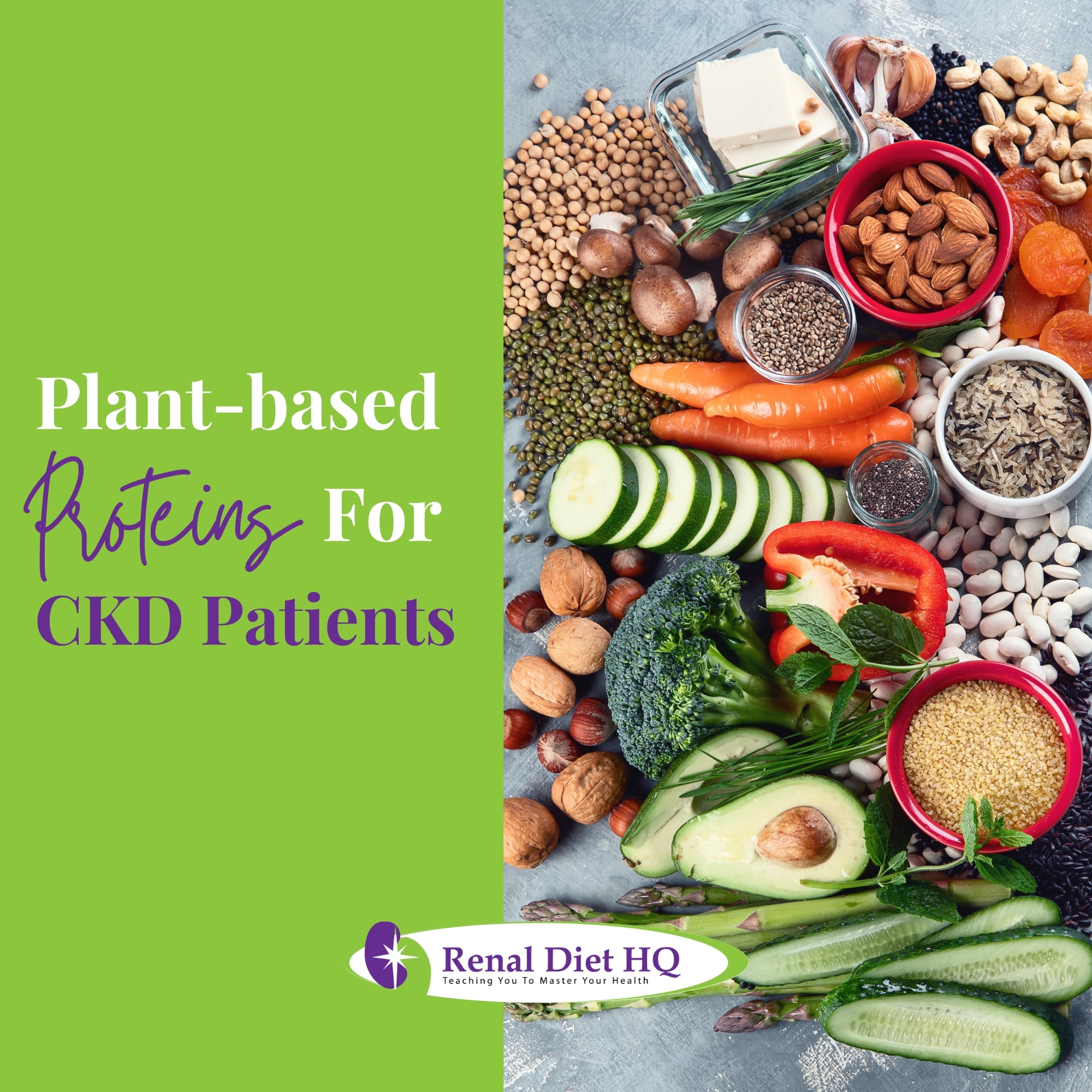
Plant-based Proteins for CKD Patients
As a CKD patient, it's crucial for you to know that not all proteins are created equal.
Plant-based proteins come with their own set of benefits and warnings, which can significantly impact your kidney health.
Let's explore the right choices for you, and understand the health implications of different plant proteins.
Choosing Right Plant Proteins
In managing your CKD, it's crucial to make smart choices when it comes to incorporating plant proteins in your diet. While evaluating protein options, consider these protein alternatives:
- Lentils and beans: Rich in protein and fiber, they're a great alternative to meat. However, watch the potassium levels.
- Whole grains: These offer essential amino acids and are a good source of protein.
- Nuts and seeds: They're high in protein, but also in phosphorus, so consume in moderation.
When it comes to protein supplementation, consider plant-based protein powders. However, always consult your dietitian to ensure you're meeting your protein requirements without overloading your kidneys.
Benefits and Warnings
When incorporating plant-based proteins into your CKD diet, it's vital to understand both the benefits and potential hazards. Plant-based proteins offer unique benefits such as phosphate control strategies and managing sodium in your diet. However, protein source difficulty can present a challenge.
| Benefits | Warnings |
|---|---|
| Lower sodium intake | Requires careful selection |
| Phosphate control | High potassium in some sources |
| Variety and flexibility | Protein source difficulty |
| Eco-friendly | Potential nutrient deficiencies |
| Lower risk of kidney disease progression | Requires diet adjustment |
Choosing the right plant proteins can help you maintain a balanced diet while managing your CKD. Remember, it's not just about going meatless, but about making conscious, informed decisions for your health. Always consult with a kidney dietitian before making drastic changes to your diet.
Precautions With Plant-Based Proteins
While embracing a plant-based diet for CKD, you need to be cautious about certain aspects.
Some beans are high in potassium, a mineral that can be harmful to your kidneys when consumed in large amounts.
Equally, be mindful of the sodium content in meat substitutes, as excessive sodium intake can further exacerbate your condition.
Potassium in Beans
You should be mindful of the potassium content in beans, a common source of plant-based protein, as it can present challenges for your kidney health. Understanding potassium levels is crucial when managing potassium intake, particularly if you have a vegetarian diet.
- Potassium and Kidney Health:
- High potassium levels can harm your kidneys, making it essential to monitor your intake.
- Potassium-rich foods, such as beans, need to be eaten in moderation.
- Managing Potassium Intake:
- Opt for low potassium foods when possible.
- Monitor your dietary intake and adjust as necessary.
- Understanding Potassium in a Vegetarian Diet:
- Beans are a fantastic source of protein, but their high potassium content can be problematic for individuals with kidney issues.
- It's crucial to balance your protein needs with your potassium intake.
Sodium in Meat Substitutes
In addition to monitoring potassium levels, it's equally important for you to be mindful of the sodium content in meat substitutes, a common source of plant-based protein. Understanding sodium intake is key to maintaining balanced nutrition, especially for CKD patients.
Sodium in processed foods and fast food can be particularly high, posing risks to heart health. You'd be surprised how quickly sodium in these foods adds up, often far exceeding daily recommended limits. Therefore, it's essential to read labels carefully to stay informed about the sodium content.
Reducing sodium in your diet doesn't mean sacrificing flavor. There are plenty of low-sodium seasoning alternatives available. Remember, keeping your sodium intake in check is a crucial part of managing your kidney health.
Advantages of Meatless Meals
Several benefits come with incorporating meatless meals into your CKD diet. Let's evaluate the advantages of plant-based proteins, the benefits of vegetarian diets, understand the role of protein intake in CKD, acknowledge the challenges of vegetarian meal planning, and consider various meatless protein options.
- Advantages of Plant-Based Proteins
- Lower in saturated fats and cholesterol.
- High in fiber, vitamins, and minerals.
- Can help regulate weight and blood pressure.
- Benefits of Vegetarian Diets
- May slow CKD progression.
- Can help manage blood sugar levels.
- Can reduce heart disease risk.
- Protein Intake in CKD
- Adequate protein is crucial in CKD management.
- Plant-based proteins can help maintain nutritional balance.
- Challenges of Vegetarian Meal Planning
- Requires careful nutrient monitoring.
- May necessitate dietary supplements.
- Balancing protein intake can be complex.
- Evaluating Meatless Protein Options
- Consider variety: beans, lentils, tofu, and more.
- Watch for high-potassium or high-phosphorus options.
- Check protein content and portion sizes.
Embrace these benefits and challenges, and your dedication to serving others through nutritional guidance will certainly make a significant difference in their CKD management.
FAQs About Meatless Meals for CKD Patients
Yes, you can use protein shakes or bars as supplements to meet your protein needs. However, be mindful of protein absorption and potential nutritional deficiencies.
Choose plant-based proteins like soy-based products when possible. But remember, supplements may carry risks, such as excess sugars and artificial additives.
Always check labels and consult a dietitian to ensure you're meeting your needs without overloading your kidneys.
You're wondering about ready-made vegetarian meals suitable for CKD patients? Well, you're in luck! There's a delicious array of options available.
Think heartwarming meatless casseroles, packed with kidney-friendly veggies.
Or how about vegetarian tacos, brimming with protein-packed beans?
Don't forget the mouthwatering vegan burgers and plant-based pizzas.
And for dessert? Scrumptious dairy-free treats.
To ensure a balanced diet as a CKD patient while following a vegetarian or vegan lifestyle, you've got to be a culinary explorer. Dive into vegan CKD recipes, brimming with vegetarian protein sources like tofu and lentils.
Opt for CKD friendly dairy alternatives like almond milk, and low potassium grains such as couscous. Don't forget to garnish your meals with calcium rich vegetables.
It's a delicious adventure, and you're in control!
Meatless Meals For CKD Patients
In conclusion, while navigating a kidney-friendly diet may seem daunting, it's entirely doable. By understanding vegetarian diets, strategically planning meals, and selecting the right plant-based proteins, you could significantly improve your kidney health.
However, remember to balance protein intake based on your CKD stage and beware of potential pitfalls. The benefits awaiting you, improved renal function, better health, and a varied palette, make the journey worthwhile.
Here's to embracing a meatless, kidney-friendly lifestyle!


